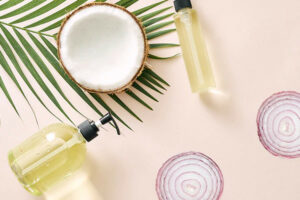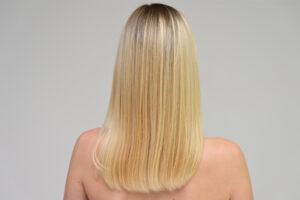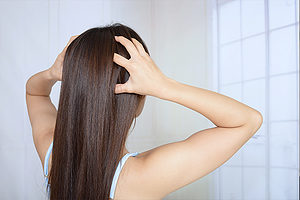Plant-based shampoos are herbal preparations that cleanse the hair and scalp naturally. Most plant-based shampoos contain nourishing ingredients and essential oils that don’t harm the hair.
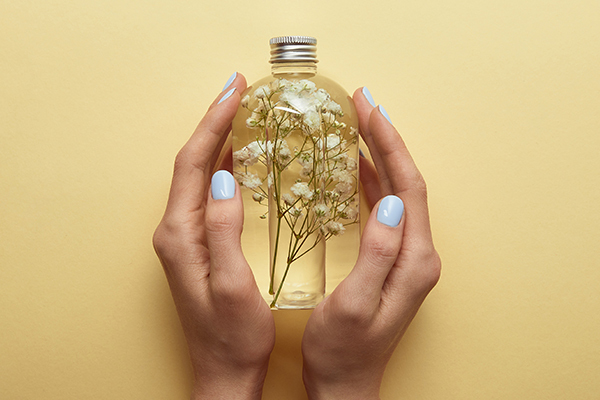
Hair cleansers are classified into one category called shampoo. These are water-based products with surfactants that effectively cleanse the hair from sebum, scalp, debris, and product buildup.
Herbal shampoos are far better and safer in comparison to synthetic shampoos. (1)
Herbs have been used since ancient times to nourish hair and treat hair issues. Plants are rich in bioactive components including essential vitamins, oils, and amino acids, making them a reliable option for hair cosmetics. They not only nourish your hair but are safer with lesser side effects.
There are endless medicinal herbs used for making herbal shampoos, and plant-based shampoos are gaining popularity in the cosmetic market today. (2)
Article Contents
Why Should You Use Plant-Based Shampoo?
Plant-based shampoo helps to improve hair quality as it provides extra moisture and shine, promotes growth, and thickens the strands. It also provides strength to the hair roots and thus reduces hair fall.
The best advantage of using herbal shampoo is it bears no risks or side effects. Many herbal shampoos contain amla, reetha, shikakai, brahmi, bhringraj, nagarmotha, aloe vera, etc. All these natural ingredients contribute to hair growth and improved hair quality. (3)
Plant-Based Shampoos for Hair
Here are a few herbs used for making plant-based shampoos.
1. Reetha
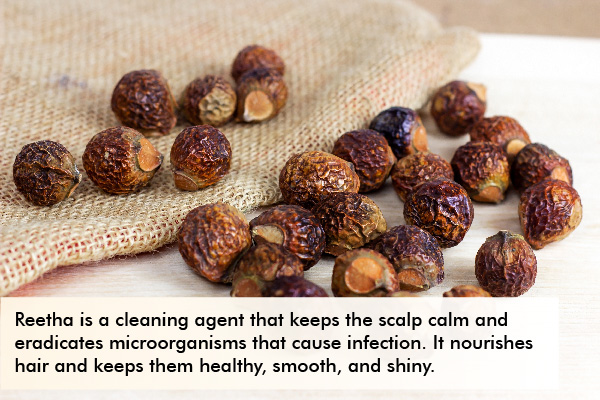
Reetha is a cleansing agent that calms the scalp and eradicates microorganisms that cause infection. It nourishes the hair and keeps them healthy, smooth, and shiny.
Moreover, it fights dandruff and provides shine and texture for great-looking hair. (3)
How to use:
- Prepare a reetha, amla, and shikakai mixture by combining 1 tablespoon of reetha powder, 1 tablespoon of amla powder, and 1 tablespoon of shikakai powder in a bowl. Add some water to make a paste.
- Apply the paste to your scalp and hair, and leave it on for 5–6 hours.
- Wash your hair carefully with tap water.
- Use this remedy twice a week for good results.
2. Amla
Amla helps nourish your hair to support the healthy growth of your tresses. It helps preserve your hair’s natural shine and texture by retaining its natural oils.
In addition, amla controls hair fall naturally without posing any side effects, unlike chemical hair treatments. It contains fatty acids that moisturize the hair, remove dryness, and control dandruff.
Moreover, amla has antioxidant properties that help to strengthen the roots of the hair. (3) It also acts as a conditioner that provides the hair with the needed nourishment, shine, and bounce.
Amla is not used as a hair cleanser, but it has nourishing properties that benefit dry scalp and dandruff. It has high vitamin C content, which neutralizes free radicals that damage the hair.
Amla is ideally combined with reetha and shikakai for hair use.
How to use:
- Take a few amla pieces and their juice and boil them in water for 30 minutes.
- Allow it to cool down and then strain it to remove the solid particles.
- Wash your hair with this mixture.
3. Shikakai
Shikakai (Acacia concinna) is an herb blessed with a high amount of vitamin C, which benefits the hair in many ways.
Shikakai helps lower the hair’s pH and retain its natural oils as it contains essential nutrients including lupeol, lactone, spinasterol, and hexacosanol. The extract from its pods acts as an effective hair cleanser and helps control dandruff.
Along with making the hair shiny and strong, it also conditions and softens it. A combination of amla, reetha, and shikakai can nourish the hair and prevent several hair problems. Moreover, you can organically retain your hair’s natural oils by using these herbs and get glossy, shiny, and healthy hair. (4)
Shikakai is quite popular among women in South Asia as it improves hair volume and increases hair strength. It also prevents scalp infections, including dandruff. (3)
How to use:
- Combine 10 g of shikakai powder, 5 g of amla powder, and 10 g of reetha powder.
- Add 750 ml of water to this mixture, mix all the ingredients well, and allow it to soak for 12 hours.
- The next morning, boil the mixture and strain the liquid into a bottle.
- Wet your hair with lukewarm water and apply the solution. Once you see lather forming, the shampoo is working on your hair.
- To get the optimum results, repeat the process two to three times a week.
4. Hibiscus
Hibiscus flowers help to improve hair growth. Hibiscus is rich in essential nutrients including calcium, phosphorus, iron, vitamin B1, riboflavin, vitamin C, and niacin. These nutrients help thicken the hair and improve hair growth and volume. Thus, using hibiscus can rejuvenate and condition your hair. (4)
The astringent features of hibiscus seal the cuticles; therefore, you will get fewer tangles in the hair when combing.
Furthermore, hibiscus petals induce hair growth and prevent premature graying, hair fall, and other scalp issues. It is a natural hair emollient and conditioner used to cleanse the hair effectively. (5)
How to use:
- Boil 15 hibiscus flowers and 5 leaves in 1 cup of water for 5 minutes. Set it aside to cool.
- Once the mixture has cooled, add 1 tablespoon of gram flour and stir well.
- Wash your hair with this mixture instead of your regular shampoo.
5. Aloe vera
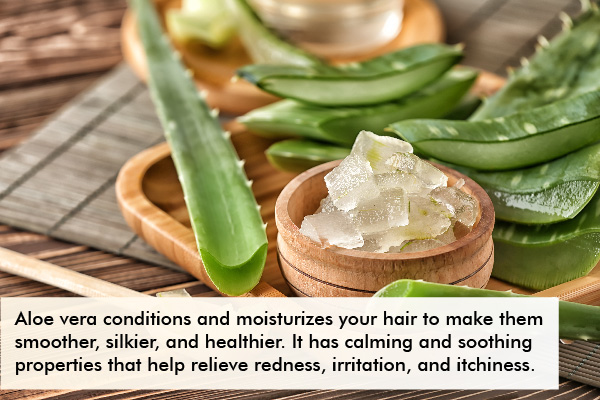
Aloe vera is commonly used as a shampoo in the Caribbean region due to its many benefits for the hair. It conditions and moisturizes your hair to make them smooth, silky, and healthy.
Additionally, aloe vera has calming and soothing properties that help relieve redness, irritation, and itchiness.
The best way to use aloe vera is to get the gel directly from the plant rather than from processed ones. Fresh aloe vera gel is glutinous and slimy and generates enough lather that cleanses your hair.
How to use:
- Gently massage fresh aloe vera gel on your scalp and leave it on for 3–5 minutes.
- Wash it off with water.
Aloe vera is more like a conditioner, not shampoo. (6)
6. Onions
Onions have many healing properties, including antibacterial, stimulating, cleansing, and nourishing. They also contain essential minerals and vitamins including vitamin C, vitamin B6, calcium, magnesium, potassium, and germanium.
They are also abundant in sulfur, a mineral present in body cells, especially in the nails and hair. The other names of sulfur are “beauty mineral” and “healing mineral,” as they promote circulation and reduce inflammation.
Onions are a popular remedy for hair loss as their sulfur content helps regenerate hair follicles and trigger hair regrowth. (7) They can be used as cleansing agents due to their calming properties.
Benefits of Plant-Based Shampoo Over Synthetic Shampoo
- Synthetic surfactants are added to shampoo because of their foaming and cleansing properties, but their constant use can cause dryness in the hair roots, trigger hair fall, and cause irritation in the scalp.
- Herbal shampoos are natural alternatives to synthetic ones. Herbs benefit the hair and are best used as a shampoo or as components of shampoos.
- Synthetic shampoos contain non-ionic, cationic, or anionic agents that act as surfactants. Sodium lauryl sulfate is quite harsh and is commonly present in synthetic shampoos.
- Aqueous extracts of herbs are used to make hair-cleansing solutions that are effective. (8)(9)
General Queries Related to Plant-Based Shampoos for Hair
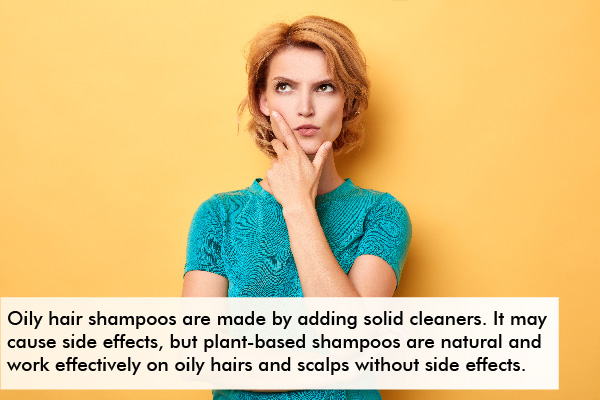
Are plant-based shampoos effective on oily hair?
Hair shampoos for oily hair are specifically made to remove sebum from the scalp and hair shaft. They contain strong cleansers and minimal conditioners. (10) Thus, they may cause side effects.
Plant-based shampoos, however, are natural and work effectively on oily hair and scalp without side effects.
Why should I choose herbal shampoos?
Herbal shampoos mainly contain herbal extracts that are rich sources of hair-beneficial compounds. Plant-based shampoos also have an ideal pH that helps in improving hair texture and maintaining the pH of the scalp with little to no side effects.
Final Word
Plant-based or herbal shampoos contain cleansing and foaming ingredients that are natural herbal extracts. These shampoos contain high polyphenolic and flavonoid content that have effective antioxidant and antibacterial actions, resulting in clean and healthy hair.
Many herbal shampoos with great qualities are available with unique aromas, colors, and abilities to create foam and cleanse. (8) The above-mentioned plant-based shampoos work best as mild shampoos with good cleansing and hair care powers.
References
- Formulation and evaluation of herbal shampoo – IJSR. https://www.ijsr.net/archive/v9i3/ART20203315.pdf.
- Azadbakht M, Monadi T, Esmaeili Z, Chabra A, Tavakoli N. Formulation and evaluation of Licorice Shampoo in comparison with commercial shampoo. Journal of pharmacy & bioallied sciences. https://www.ncbi.nlm.nih.gov/pmc/articles/PMC6266641/. Published 2018.
- Preparation of herbal shampoo (HS) by Green Method and their … https://www.researchgate.net/publication/319173153/.
- The Open Dermatology Journal – Bentham open. https://benthamopen.com/contents/supplementary-material/TODJ-12-54-Sp.pdf.
- (PDF) chemical constituents, pharmacological effects and therapeutic … https://www.researchgate.net/publication/326972460/.
- Kumar KPS, Bhowmik D, Chiranjib, Biswajit. Aloe vera: A potential herb and its medicinal importance. Journal of Chemical and Pharmaceutical Research. https://www.jocpr.com/abstract/aloe-vera–a-potential-herb-and-its-medicinal-importance-12.html. Published January 30, 2010.
- Onion juice: An effective home remedy for combating alopecia. https://www.researchgate.net/publication/273758703/.
- View of use of traditional Indian herbs for the formulation of shampoo and their comparative analysis: International Journal of Pharmacy and Pharmaceutical Sciences. View of USE OF TRADITIONAL INDIAN HERBS FOR THE FORMULATION OF SHAMPOO AND THEIR COMPARATIVE ANALYSIS | International Journal of Pharmacy and Pharmaceutical Sciences. https://innovareacademics.in/journals/index.php/ijpps/article/view/9868/4813.
- Shampoos based on synthetic ingredients vis -a vis shampoos based on … https://www.globalresearchonline.net/journalcontents/volume7issue1/Article-007.pdf.
- Draelos ZD. Essentials of hair care often neglected: Hair cleansing. International journal of trichology. https://www.ncbi.nlm.nih.gov/pmc/articles/PMC3002407/. Published January 2010.


